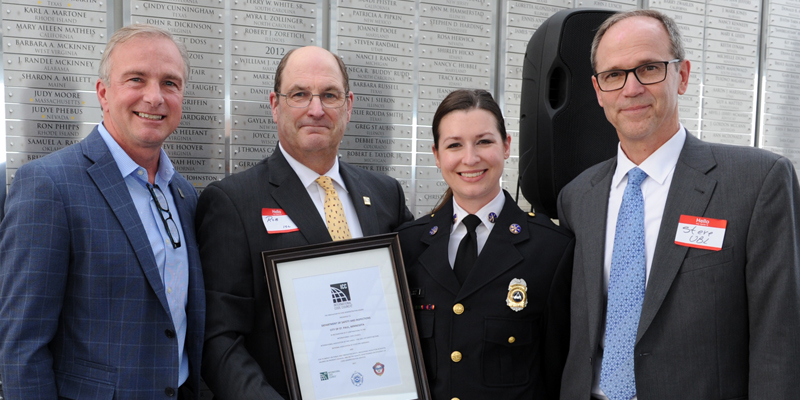


ICC Innovation in Code Administration Award presented to City of Saint Paul, Minn. |
Inaugural award recognizes building and fire departments for innovation in the delivery of code administration services in communities |
SHARE    |
 |
| Accepting the inaugural Innovation in Code Administration award on behalf of the City of Saint Paul is Angie Wiese, PE, CBO, Fire Safety Manager of the Department of Safety and Inspections and Steve Ubl, Building Official of the Department of Safety and Inspections. Pictured (left-right): International Code Council Chief Executive Officer Dominic Sims, CBO; Government Relations Vice President of National Fire Service Activities Rob Neale; Angie Wiese; and Steve Ubl. Photo: Jocelyn Augustino | FEMA |
| In recognition of its 10-year effort to reduce residential injuries, deaths and fires through a rental inspection program and property grading schedule, the International Code Council (ICC) awarded its 2017 ICC Innovation in Code Administration Award to the City of Saint Paul, Minn., Department of Safety and Inspections. The inaugural award was fittingly presented during the Code Council's annual Building Safety Month Reception on May 10 at the Council's Governmental Affairs Office in Washington, D.C. Through its use of the Minnesota version of the International Fire Code and Saint Paul's local property maintenance code, the City created a residential life-safety inspection program 10 years ago that assigns letter grades to rental properties. Grades are based on safety factors such as smoke alarms, egress windows, safe storage practices and electrical safety. Of the 15,230 properties in Saint Paul's system, 52 percent are scored A's, 27 percent are B's, 20.5 percent are C's and 0.5 percent are D's. The C-graded units continue to improve year after year — overall, 41 percent of the properties improved their grade over the previous inspection, while 45 percent stayed the same. "Strong building codes and standards, adoption, implementation and enforcement are the most effective and affordable tools we have to guarantee that our communities stay safe, healthy and comfortable." Saint Paul is continually finding new ways to help property owners maintain A-grade properties; their latest endeavor is advertising the letter grade on a web-based interactive map. Each home visit includes fire safety messaging, and by tying the success of their inspection to inspection frequency and fees, everyone wins with safer buildings and fewer costs to the property owner. "Code officials often do not get the credit they deserve for the work they do in keeping us safe in the built environment," said International Code Council Chief Executive Officer Dominic Sims, CBO. "Keeping in mind this year's Building Safety Month theme of Code Officials — Partners in Community Safety and Economic Growth, we recognize and thank code officials for their efforts and progress in making our communities better by constructing safe, affordable and resilient buildings." "Strong building codes and standards, adoption, implementation and enforcement are the most effective and affordable tools we have to guarantee that our communities stay safe, healthy and comfortable," added ICC Board of Directors President M. Dwayne Garriss, who serves as the Georgia State Fire Marshal. "We are especially proud to recognize those code professionals who are actively working to improve the quality, effectiveness and efficiency of code administration services in a creative way." Created by the International Code Council Family of Companies to acknowledge public safety creativity in the built environment, the ICC Innovation in Code Administration Award recognizes building and fire departments for innovation in the delivery of code administration services in their communities. It is sponsored by the International Association of Fire Chiefs — Fire and Life Safety Section, the National Association of State Fire Marshals, and the Code Council. The award is presented to a building or fire code organization that provides code administration services to one or more jurisdictions. The organization must have implemented a unique approach to positively enhance code administration services in the community, resulting in a measurable reduction in deaths, injuries or property damage, and/or the quality, effectiveness, or efficiency of code administration services. |